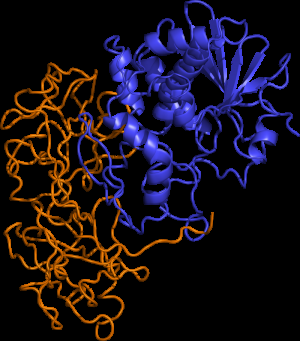March 17, 2015 report
Researchers report successful test of thermostable ricin vaccine in macaques

(Medical Xpress)—Ricin toxin (RT), the second most lethal toxin known, is produced by the plant Ricin communis, and is a byproduct of castor oil. Because it is easily produced, the military has had a longstanding goal of developing a prophylactic ricin vaccine, though none has yet been added to the U.S. National Vaccine Stockpile.
A collaborative of researchers has recently published a study of a thermostable ricin vaccine that protects rhesus macaques challenged with a lethal aerosolized dose of ricin toxin. Significantly, this is the first published report that demonstrates the protection of nonhuman primates against RT via a recombinant vaccine for ricin catalytic class II ribosome inactivating protein (RTA).
Moreover, the researchers observe that the blood serum of the vaccinated macaques has an antibody profile identical to the serum of nine vaccinated humans from a previous trial, indicating that rhesus macaques may provide an excellent model for human ricin immunity. The results appear in the Proceedings of the National Academy of Sciences.
Disarming RTA for vaccination
Ricin toxin attacks cells at the most basic level of metabolism, blocking cells from assembling amino acids into proteins according to the messenger RNA template. Victims of ricin poisoning develop symptoms from within a few hours to a day following exposure, manifesting nausea, tachycardia, hypotension, and seizure, among other symptoms. Exposure usually results in death; survivors often suffer from organ damage.
The recombinant vaccine, called RiVax, uses two RTA mutations engineered to eliminate the protein's enzymatic activity and its ability to induce vascular leak syndrome in humans. The researchers write, "The crystal structure of RiVax is virtually identical to that of native RTA, indicating that the two amino acid mutations have a minimal effect on the tertiary structure of the protein." It is considered safe for injection both with and without an aluminum hydroxide adjuvant for mice, rabbits and humans.
No RT vaccine can be tested on humans, however, and the study finds that macaques may provide an excellent RiVax-induced immunological correlate. Rhesus macaques received three vaccinations with lyophilized RiVax at monthly intervals; seven weeks after the third vaccination, all were challenged with a lethal dose of aerosolized RT.
Unvaccinated control animals all developed symptoms within 12 hours of exposure; those were euthanized around 42 hours later. Nonvaccinated animals exhibited extensive lung damage and tracheobronchial lymph node lesions.
By contrast, eleven of the 12 vaccinated macaques survived, and none showed any of the symptoms exhibited by the control group. "Animals surviving until 14 days after exposure to RT were grossly normal, except for occasional mild multifocal proliferation of fibroblasts with collagen deposition around terminal respiratory bronchioles, which were ofen lined by hyperplasic epithelium," the researchers write. Neutralizing antibodies were induced in all of the vaccinated animals.
One of the vaccinated animals was euthanized after 47 hours due to complications from bacterial pneumonia; the researchers cite several possible causes, including lung compromise, but the study is unable to establish the cause of death.
The researchers determined via serum antibody comparison that macaques and humans exhibit the same signature antibody profile, "suggesting that humans and macaques respond to similar epitopes on RiVax."
Results
The vaccine was lyophilized for long-term stability so that it may be stockpiled, remaining fully immunogenic and protective in a mouse model. Three doses of vaccine induced neutralizing antibodies that completely protected the macaques from aerosolized ricin toxin. Before the aerosol challenge, blood serum from all animals showed a distinctive antibody profile identical to that observed in human serum from a previous clinical trial.
The researchers indicate that further clinical development will seek dosages for the optimal protection of lungs and deepen the investigation of rhesus monkeys as an immunologic correlate of humans.
More information: "Thermostable ricin vaccine protects rhesus macaques against aerosolized ricin: Epitope-specific neutralizing antibodies correlate with protection." PNAS 2015 ; published ahead of print March 9, 2015, DOI: 10.1073/pnas.1502585112
Abstract
Ricin toxin (RT) is the second most lethal toxin known; it has been designated by the CDC as a select agent. RT is made by the castor bean plant; an estimated 50,000 tons of RT are produced annually as a by-product of castor oil. RT has two subunits, a ribotoxic A chain (RTA) and galactose-binding B chain (RTB). RT binds to all mammalian cells and once internalized, a single RTA catalytically inactivates all of the ribosomes in a cell. Administered as an aerosol, RT causes rapid lung damage and fibrosis followed by death. There are no Food and Drug Administration-approved vaccines and treatments are only effective in the first few hours after exposure. We have developed a recombinant RTA vaccine that has two mutations V76M/Y80A (RiVax). The protein is expressed in Escherichia coli and is nontoxic and immunogenic in mice, rabbits, and humans. When vaccinated mice are challenged with injected, aerosolized, or orally administered (gavaged) RT, they are completely protected. We have now developed a thermostable, aluminum-adjuvant–containing formulation of RiVax and tested it in rhesus macaques. After three injections, the animals developed antibodies that completely protected them from a lethal dose of aerosolized RT. These antibodies neutralized RT and competed to varying degrees with a panel of neutralizing and nonneutralizing mouse monoclonal antibodies known to recognize specific epitopes on native RTA. The resulting antibody competition profile could represent an immunologic signature of protection. Importantly, the same signature was observed using sera from RiVax-immunized humans.
© 2015 Medical Xpress


















